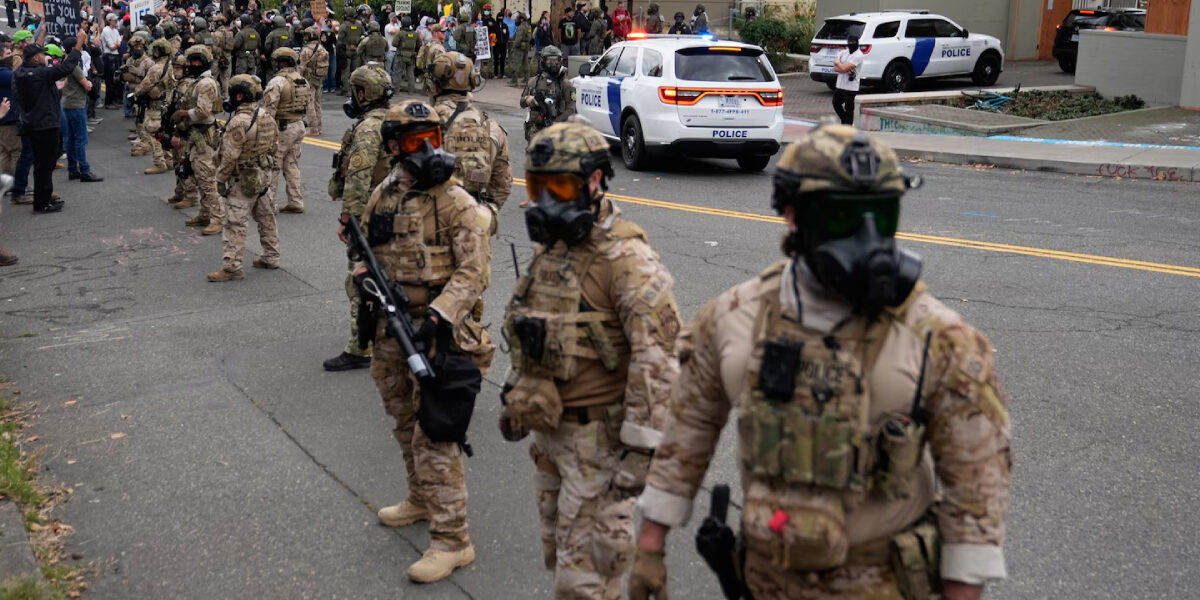A federal judge has temporarily halted President Donald Trump’s plan to deploy military troops to Portland, Oregon, dealing a legal setback to his administration’s efforts to send federal forces into U.S. cities.
U.S. District Judge Karin J. Immergut, who was appointed by Trump, ruled that the move violated Oregon’s constitutional right to control its own National Guard. In her decision, Immergut emphasized the importance of limiting federal overreach.
“This nation has a long and proud tradition of resisting government overreach, especially when it involves military intrusion into civilian life,” she wrote. “We are a country of laws, not martial law.”
The temporary restraining order will remain in effect until October 18, though Immergut suggested it could be extended after a hearing scheduled for October 17.
Immergut said the president’s justification for deploying troops was “untethered to the facts” and went beyond the scope of his authority. While acknowledging that presidents deserve some level of deference in security decisions, she stated that such respect “does not mean ignoring the facts on the ground.”
The Trump administration quickly announced plans to appeal the ruling. White House spokesperson Abigail Jackson defended the president’s decision, saying Trump was acting within his rights to “protect federal assets and personnel in Portland following violent riots and attacks on law enforcement.”
Oregon Attorney General Dan Rayfield praised the court’s ruling, calling it a “wake-up call” for the president.
“No president can use social media posts or made-up claims to justify deploying the U.S. military in our cities,” Rayfield said. “This ruling protects our democracy from setting a dangerous precedent.”
Oregon’s Legal Challenge
The dispute began after Trump announced last month that he would send troops to Portland, claiming the city was “war-ravaged.” Defense Secretary Pete Hegseth then ordered 200 Oregon National Guard members to be deployed for 60 days.
Oregon officials immediately filed a lawsuit, calling the deployment “patently unlawful.” They argued that it stripped the state of control over its own National Guard, diverted resources from other critical duties, and risked inflaming local tensions.
The case was initially assigned to Judge Michael H. Simon, an Obama appointee, but he recused himself after government lawyers cited comments made by his wife, Democratic Rep. Suzanne Bonamici, who had publicly criticized the deployment. The case was then reassigned to Immergut.
In court filings, Oregon officials said federalizing the state’s National Guard violated both the Constitution and the Posse Comitatus Act, which prohibits using the military for domestic law enforcement.
Administration’s Defense
Government lawyers argued the deployment was necessary to protect federal immigration officers and a U.S. Immigration and Customs Enforcement (ICE) facility in Portland that had faced protests.
They said “violent activists” had assaulted agents and damaged the building, forcing temporary closures. The administration argued that the deployment of 200 troops was “narrowly tailored” to this specific threat — much smaller than the 4,000 troops Trump sent to Los Angeles earlier in the summer.
Still, Oregon officials said protests at the ICE facility had been peaceful and small in recent weeks, involving fewer than 30 people with no arrests since June. Portland police also filed a statement saying that federal troop deployment was “unnecessary and counterproductive.”
Craig Dobson, assistant chief of operations for the Portland Police Bureau, warned that sending troops could “escalate tensions and reignite unrest.”
National Pushback
The legal fight in Oregon is part of a broader backlash against Trump’s attempts to use federal forces in U.S. cities. Judges in other states have already ruled against similar deployments.
In September, a federal judge in California found that Trump’s use of National Guard troops in Los Angeles violated the Posse Comitatus Act, though that ruling was paused pending appeal.
Trump has also authorized the deployment of National Guard troops to Washington, D.C., Illinois, and Tennessee — moves that have drawn sharp criticism from Democratic governors and mayors who say their states do not need federal intervention.
Protests Remain Calm
Immergut’s ruling noted that when Trump first announced the Portland deployment, protests in the city had been largely calm. But the night after Defense Secretary Hegseth issued the deployment order, the number of demonstrators suddenly grew from a few dozen to about 200.
“The size of the protests increased substantially,” Immergut wrote, suggesting that the announcement itself may have fueled renewed unrest.
On Saturday, small groups gathered again near the ICE facility. Many criticized the idea of bringing in troops.
“How much money are we wasting sending the National Guard to Portland?” asked Adam Billington, a local high school teacher observing the protest. “We need conversations, not confrontation.”
For now, Oregon’s leaders have secured a temporary reprieve from federal intervention. Whether the restraining order will become permanent may depend on what unfolds in the courtroom later this month — and how far the White House is willing to push its authority in the states.
